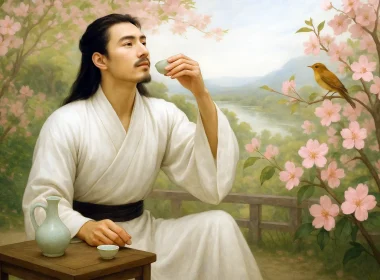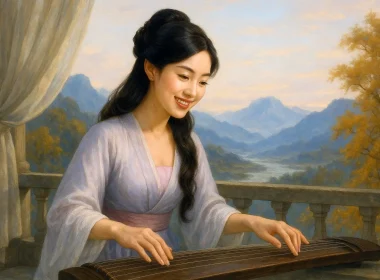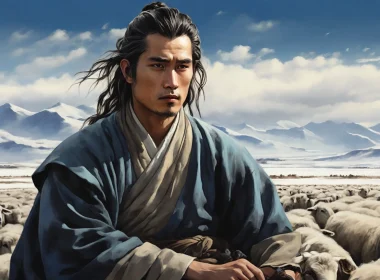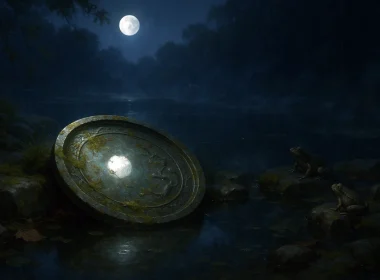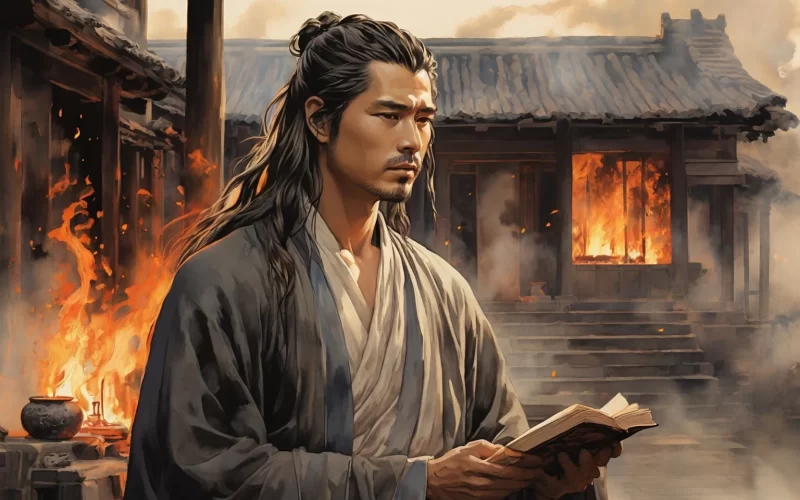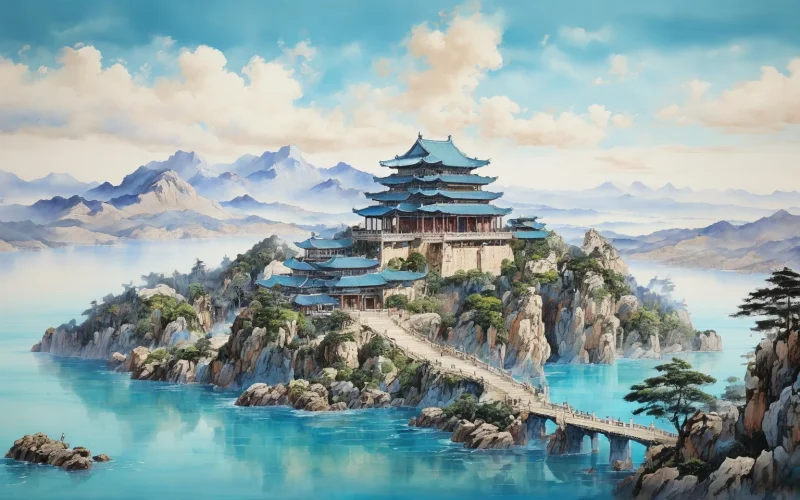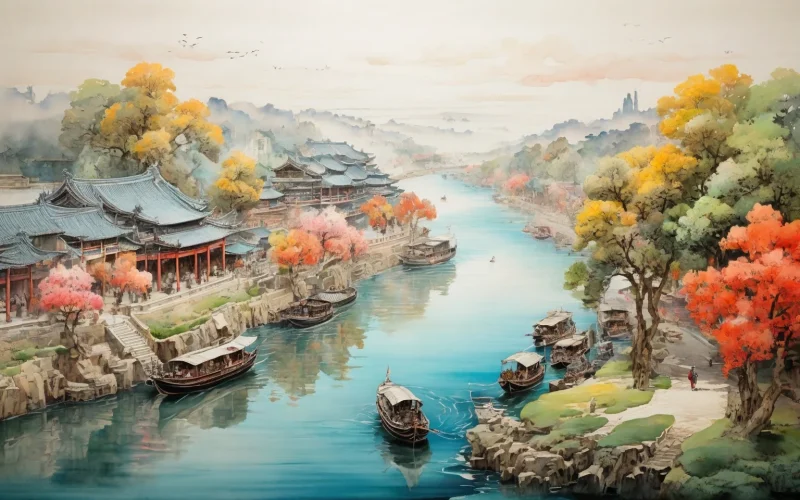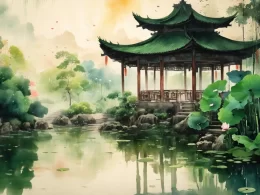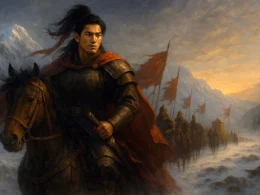Smoke of burnt classics gone up with the empire's fall;
Fortresses and rivers could not guard the capital.
Before the pit turned cold, eastern rebellions spread,
The leaders of revolts were not scholars Well-read.
Original Poem
「焚书坑」
章碣
竹帛烟销帝业虚,关河空锁祖龙居。
坑灰未冷山东乱,刘项原来不读书。
Interpretation
This poem likely stems from Zhang Jie's reflections during travels or visits to historical sites, particularly those connected to Qin Shi Huang's infamous "Burning of Books and Burying of Scholars." Using this historical episode as his theme, the poet critiques the First Emperor's tyrannical acts, exposing how the destruction of knowledge ultimately undermined the empire's destiny.
First Couplet: "竹帛烟销帝业虚,关河空锁祖龙居。"
Zhú bó yān xiāo dì yè xū, guān hé kōng suǒ zǔ lóng jū.
As bamboo slips and silk scrolls vanished in smoke, the imperial enterprise turned void;
Though fortified passes and rivers stood guard, they but vainly shielded the Ancestral Dragon's abode.
The poet encapsulates the book-burning incident through "bamboo slips and silk scrolls vanished in smoke," metaphorically suggesting that Qin Shi Huang's actions destroyed not only culture but the empire's very foundations. "Imperial enterprise turned void" implies that despite building a powerful regime, the suppression of thought and historical legacy led to its rapid collapse. The term "Ancestral Dragon's abode" (Qin Shi Huang's self-styled title) highlights the contradiction between the Qin dynasty's grandiose ambitions and its short-lived fate.
Second Couplet: "坑灰未冷山东乱,刘项原来不读书。"
Kēng huī wèi lěng Shāndōng luàn, Liú Xiàng yuánlái bù dúshū.
Before the pit's ashes cooled, Shandong's revolts began;
Liu Bang and Xiang Yu—truth be told—were never men of letters.
This couplet continues the satirical critique. The revolts erupting while "the pit's ashes [were] still warm" demonstrate how the book-burning failed to ensure stability. The punchline—"Liu and Xiang never read books"—delivers ironic wit: the rebels who toppled Qin required no texts to spark insurrection. This humorous yet piercing observation lays bare the absurdity of the censorship campaign, revealing how cultural destruction ultimately proved futile against the tide of history.
Holistic Appreciation
Zhang Jie's poem tightly links the book-burning incident with the short-lived Qin dynasty, revealing how extreme historical actions negatively impacted a nation's destiny. The line "As bamboo scrolls turned to smoke, the imperial enterprise vanished into emptiness" critiques Qin Shi Huang's suppression of thought and prohibition of scholarship as absurd. Meanwhile, "Before the pit's ashes cooled, rebellion erupted east of the mountains" uses hyperbole to show how the book-burning failed to bring stability—instead fueling chaos. Finally, "Liu Bang and Xiang Yu—turns out they never studied books!" employs humor and irony to sharpen the condemnation, exposing the irrationality and folly of this historical act. The poem progresses layer by layer, moving from individual absurdity to national upheaval, offering profound reflection on the abuses of power.
Artistic Merits
- Integration of Historical Events and Fate
The phrase "bamboo scrolls turned to smoke" deftly connects the historical incident with the Qin dynasty's collapse, embodying a deep critique of the infamous "burning of books and burying of scholars." - Masterful Use of Satire and Irony
In the closing couplet, the poet ironically highlights Liu Bang and Xiang Yu's illiteracy—seemingly a casual observation, but in truth, a pointed mockery of the futility of Qin's book-burning. - Hyperbole and Humor in Tandem
Lines like "Before the pit's ashes cooled" and "Liu Bang and Xiang Yu—turns out they never studied books!" exaggerate history's rapid turns while using humor to amplify the satirical edge. - Unique Historical Perspective
Beyond condemning Qin's tyranny, the poem, through its ironic twist on Liu and Xiang's lack of education, reveals that book-burning wasn't the root cause of Qin's fall—showcasing the poet's independent historical insight.
Insights
This poem delivers a profound historical lesson through its critique of Qin's book-burning: attempts to suppress thought and culture cannot secure a nation's future—they may instead invite greater disaster. With humor, the poet exposes how such acts fail to alter history's course, only making it more turbulent. It reminds us that true strength lies not in tyranny and repression, but in respecting culture, thought, and the will of the people.
Poem translator
Xu Yuanchong (许渊冲)
About the Poet
Zhang Jie (章碣, 836 - 905), a native of Tonglu, Zhejiang, was a Late Tang dynasty poet. After attaining the jinshi degree in 876, he retired to his hometown. A master of seven-character regulated verse (qilü), his poetry is marked by incisive language and a satirical edge—reminiscent of Luo Yin’s style but more vehement in tone. Among Late Tang’s polemical poets, he carved out a distinctive niche.


